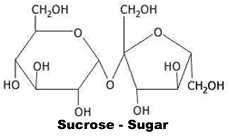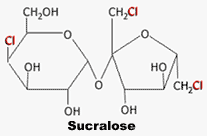I am currently finishing a bachelor of science in both Human Nutrition and Human Kinesiology. My job while at the university is a personal trainer and nutritional consultant. One of the most popular topics I get asked about is artificial sweeteners.
With the media blowing up poor research papers and researchers misinterpreting results, it's easy to get confused as to where we stand. Is aspartame really safe? What's with Sucralose? And what is going on with sugar alcohols?
In this article I will review the research on the new and old artificial sweeteners. As well I will look at who should avoid certain sweeteners and how we can all benefit by using sweeteners in everyday life.
Sucralose
I will start with one of the newest sweeteners on the market, Sucralose, or Splenda as it is also known and sold. Splenda is simply sucrose, chemically combined with chlorine. On the label of many boxes of Splenda it reads "made from real sugar." This is technically true, but technically is also a completely different molecule with chlorine attached to it.


Sucrose & Sucralose Molecules.
However, because this chlorine is attached to sucrose, our bodies' digestive enzymes do not recognize it as sugar and therefore is not absorbed. This means, no calories. As of right now sucralose passed all safety tests in animal studies and is generally accepted as one of the safest alternatives to sugar. Because of its sweet taste, ease of use, and lack of Calories, Sucralose, or "Splenda" makes the top of my list.
Neotame
Neotame is a synthetic derivative of a combination of aspartic acid and phenylalanine (which are the exact same two amino acids which make up aspartame). The difference between neotame and aspartame is that aspartame has a weaker chemical bond holding the two amino acids together.
The stronger bond in neotame means our body cannot break down and metabolize neotame. It is the amino acid phenylalanine, which is toxic to people with a rare disorder phenylketonuria or PKU. Everyone is tested for PKU at birth as it would mean you would have to avoid all foods containing phenylalanine.
 |
Phenylketonuria: Phenylketonuria (PKU) is a human genetic disorder, in which the body lacks phenylalanine hydroxylase, the enzyme necessary to metabolize phenylalanine to tyrosine. Left untreated, the disorder can cause brain damage and progressive mental retardation as a result of the accumulation of phenylalanine and its breakdown products. The incidence of occurrence of PKU is about 1 in 15,000 births, but the incidence varies widely in different human populations from 1 in 4,500 births among the Irish to fewer than one in 100,000 births among the population of Finland. |
 |
 |
||
Neotame shows promise as one of the newer sweeteners and may be a safe alternative to those with PKU who want to use artificial sweeteners. This being said, it is currently not found in any foods, however, watch for it as it is an up and coming sweetener I think we will see a lot of in the near future.
Sugar Alcohols
I will tell you a story about sugar alcohols that some of you may relate to. I was dieting for the Canadian nationals when I popped into the local nutrition store to chat it up with my old boss. I mentioned I was dieting and having sweet cravings. She said "well you're in luck Ryan, we just got this new product in with zero calories and a new sweetener in it."
I was so excited I didn't even ask questions. There were candy bars, gummy bears, gummy worms, and chocolate mints. I took about 3 of each and started snacking on them with my friend. The bag was gone before we got to the car, and I contemplated going back for more, but decided to just come back the next day.
My friend suddenly just ripped a huge fart. Of course we started laughing... I mean, who doesn't laugh when someone farts. You can be at a funeral and if someone rips one, you know you're laughing. The laughter didn't last two long as I started getting these pains in my stomach.
I started farting as well. I'm not talking small farts. I mean, these were good 9-to-10 second rippers. And they were ripe. We got back to my friends house, and his girlfriend lasted about 3 minutes in the house before leaving. "You guys are sick, there's something wrong with you" she said.
Well... she was right. Turns out the sugar alcohol is not completely digested and only about half is absorbed. That means the other half is left causing cramps, gas, and diarrhea. I didn't go back to get more candy the next day.
Sugar alcohols aren't sugars and unfortunately won't get you drunk. Sugar alcohols are made by adding hydrogen atoms to sugars. (Adding hydrogen to glucose makes sorbitol). Because you can add hydrogen atoms to any sugars, there are several different kinds of sugar alcohols. For example, you may have seen sorbitol, xylitol, mannitol, malitol, lactitol, ismalt, erythritol, and hydrogenated starch hydrolysates.
Some of these are absorbed better than others but they generally provide about half of what the label claims. So if you see a product with 20 grams of sugar alcohols, they will provide 10 grams of actual sugar.
The benefit comes because sugar alcohols are so slowly digested and absorbed that they cause a very low insulin release. (To learn more about sugars and their affect on insulin levels see my article "everything you need to know about carbohydrates").
Sugar alcohols can be used with a 1:1 ratio with real sugars when putting them in new products. It is recommended that you not take in more than 10 grams of sugar alcohols unless you want the gas and bloating. Now, you may be able to get away with about 8 grams in the morning, and maybe 10 later in the afternoon, but use caution and find what works with your body.
Besides the laxative effect, sugar alcohols have no adverse effects in humans. Use caution though, take it from me, and those within a 30 mile radius of my friend and I on that fateful day.

 Tagatose
Tagatose
This new sugar is only found in 7-11's diet Pepsi slurpies and is similar to sugar alcohol. It is safe, but too much will cause the same effect as sugar alcohols. Because it's only found in 7-11 slurpies, that's all I'm going to say about it.

 Aspartame
Aspartame
Aspartame is a synthetic derivative of a combination of the two amino acids aspartic acid and phenylalanine. It is commonly found as Equal, NutraSweet, and NatraTaste. Aspartame is needed in extremely small amounts to sweeten foods and has no effect on blood sugars. Almost everyone has heard that aspartame increases the risk of cancer.
This is a serious charge and what is amazing is that this has never been proven. I'm going to say this again. There are no scientifically supported studies that have proven Aspartame causes cancer. This information comes from the internet (more often than not from someone trying to sell you something), or from badly sourced newspaper articles.
Aspartame is dangerous though, to those of you that suffer from the rare disorder known as phenylketonuria or PKU. As mentioned earlier, those with PKU cannot digest phenylalanine, and must avoid numerous foods containing the amino acid.
Another popular claim is that aspartame causes headaches. This is unclear and again has never been proven. The research on this has shown no correlation (by an industry funded study, i.e., probably not the best source), and an independent test in 1994 that concluded that some individuals do experience headaches, but fewer than the number who believe they do.
What's my take on this? Well, how many of us growing up touched the hot oven? And how many touched a red hot element twice? Most likely none. Because you learned the first time that red hot ovens don't feel good when you touch them. Try aspartame, if you get a headache, don't use it anymore. It's that simple. The only other people that should avoid aspartame are pregnant females.
Aspartame has a bad wrap, but research has improved in this area and more and better studies have been done. I think more independent studies need to be done to ensure it's safety, but aspartame is most likely not going to cause you a problem. The nice thing these days is that there are lots of alternatives.

 Acesulfame
Acesulfame
Like many other sweeteners, our body cannot metabolize acesulfame. This sweetener just hasn't been tested enough. The few studies that have been done on it, show flip flopping results. I personally would try to avoid it until more research is done on it.

 Stevia
Stevia
Stevia is an extract from a shrub that grows in Brazil and Paraguay and again, our bodies cannot metabolize stevia. Animal studies were not promising. Male rats fed high doses of stevioside (stevia's active ingredient) for 22 months; they produced fewer sperm and showed signs of possible infertility.
This and other studies with similar results caused the FDA, Health Canada, the European Union, and the World Health Organization to conclude that stevia shouldn't be allowed in food. However this doesn't mean it's gone.
Stevia can be bought and sold as a supplement since safety rules for supplements are looser than for foods. I think more research needs to be done before stevia should be used as an alternative to sugar. Especially with safe alternatives such as sucralose available.

 Saccharin
Saccharin
Sweet N Low as it is most often seen on the shelves, is one of the oldest sweeteners and was discovered in 1879. Again, our body cannot metabolize these sugars and therefore cannot absorb it. Sweet N Low has a checkered, sketchy past. In 1977 the FDA tried to ban saccharin because animal studies showed that it caused cancer of the uterus, ovaries, bladder, skin, and other organs.
Bowing to pressure from the diet-food industry and dieters seeking an alternative to sugars, congress intervened to keep saccharin on the market, with a warning on the label. Again, something like this puts a red flag up for me and with so many other substitutes available, why risk it?
As with any sticky subject, don't judge your decision on what the media says. Just because it is in a magazine, or a newspaper, doesn't mean what is being said is true. Check out as many articles from as many different sources as possible, then base your personal decision on them.

Conclusion
In my opinion artificial sweeteners can be a great way to reduce calories in your diet and still satisfy the sweet tooth. With that being said, not all artificial sweeteners are the same and it is important to know what each does before using it. As with anything in life, moderation is the key. If you are consuming 8 diet cokes per day, it may be time for a change.
As always, keep training hard and feel free to contact me with any questions or concerns. This may be a sport... but it's not a game!
Related Articles:
- Use Of Nutritive And Nonnutritive Sweeteners.
- Can Sugar Make You Sick?
- Sucralose: Is This Sweetener Right For You?
- Artificial Sweeteners: Aspartame
